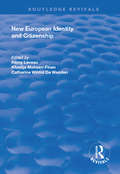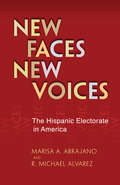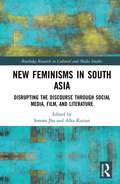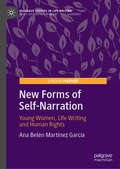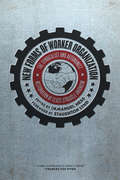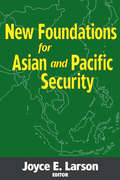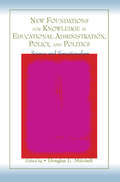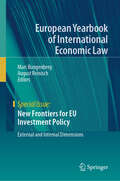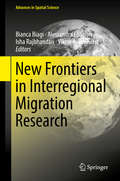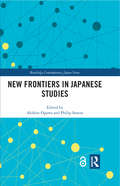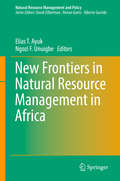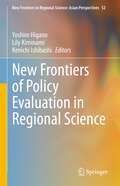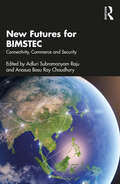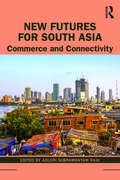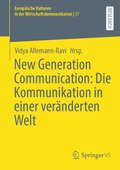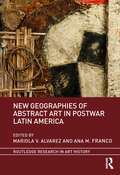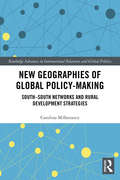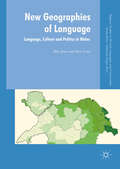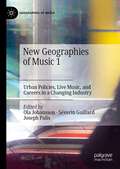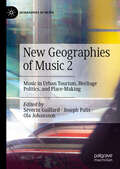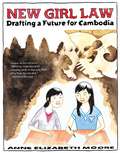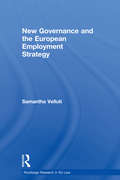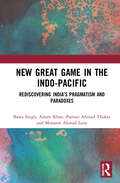- Table View
- List View
New European Identity and Citizenship (Routledge Revivals Ser.)
by RÉMY LEVEAU, KHADIJA MOHSEN-FINAN AND CATHERINE WIHTOL DE WENDENThis title was first published in 2002. This study, undertaken with the support of the Ford Foundation under the scientific leadership of Khadija Mohsen-Finan, Remy Leveau and Catherine Wihtol de Wenden considers the new forms of citizenship and identity that have emerged within the settlements of immigrant populations in various countries in Europe. Through their claims to citizenship, shifting religious identities and by occupying the high ground both locally and at European level, these communities challenge long standing citizenship models and give full meaning to the concepts of supranational European citizenship. The contributors question whether such European citizenship will include all residents of Europe or whether it will serve to increase the exclusion felt by certain groups of migrants. In particular the contributors examine the implications of three emerging citizenship trends - the impact of the demand for Islam; the emergence of undocumented migrants and their inclusion in an increasingly stratified society; and finally, the rising tide of ordinary or political refugees who are challenging European citizenship on their own terms.
New Faces, New Voices: The Hispanic Electorate in America
by Marisa A. Abrajano R. Michael AlvarezA comprehensive look at Hispanic voters in the United StatesMaking up 14.2 percent of the American population, Hispanics are now the largest minority group in the United States. Clearly, securing the Hispanic vote is more important to political parties than ever before. Yet, despite the current size of the Hispanic population, is there a clear Hispanic politics? Who are Hispanic voters? What are their political preferences and attitudes, and why? The first comprehensive study of Hispanic voters in the United States, New Faces, New Voices paints a complex portrait of this diverse and growing population.Examining race, politics, and comparative political behavior, Marisa Abrajano and R. Michael Alvarez counter the preconceived notion of Hispanic voters as one homogenous group. The authors discuss the concept of Hispanic political identity, taking into account the ethnic, generational, and linguistic distinctions within the Hispanic population. They compare Hispanic registration, turnout, and participation to those of non-Hispanics, consider the socioeconomic factors contributing to Hispanics' levels of political knowledge, determine what segment of the Hispanic population votes in federal elections, and explore the prospects for political relationships among Hispanics and non-Hispanics. Finally, the authors look at Hispanic opinions on social and economic issues, factoring in whether these attitudes are affected by generational status and ethnicity.A unique and nuanced perspective on the Hispanic electoral population, New Faces, New Voices is essential for understanding the political characteristics of the largest and fastest growing group of minority voters in the United States.
New Feminisms in South Asian Social Media, Film, and Literature: Disrupting the Discourse (Routledge Research in Cultural and Media Studies)
by Sonora Jha Alka KurianThis book is a study of the resurgence and re-imagination of feminist discourse on gender and sexuality in South Asia as told through its cinematic, literary, and social media narratives. It brings incisive and expert analyses of emerging disruptive articulations that represent an unprecedented surge of feminist response to the culture of sexual violence in South Asia. Here scholars across disciplines and international borders chronicle the expressions of a disruptive feminist solidarity in contemporary South Asia. They offer critical investigations of these newly complicated discourses across narrative forms – hashtag activism on Facebook and Twitter, the writings of diasporic writers such as Jhumpa Lahiri, Bollywood films like Mardaani, feminist Dalit narratives in the fiction of Bama Faustina, social media activism against rape culture, journalistic and cinematic articulations on queer rights, state censorship of "India’s Daughter", and feminist film activism in Bangladesh, Kashmir, Nepal, and Sri Lanka.
New Forms of Governing
by Peter TriantafillouTriantafillou analyzes the changing ways of governing the public sector and the ways in which public organizations have become the target of interventions seeking to improve their efficiency and quality. He exposes how political and social science theories were adopted in often unpredictable ways in the process of reforming the public sector.
New Forms of Self-Narration: Young Women, Life Writing and Human Rights (Palgrave Studies in Life Writing)
by Ana Belén Martínez GarcíaThis book is a timely study of young women’s life writing as a form of human rights activism. It focuses on six young women who suffered human rights violations when they were girls and have gone on to become activists through life writing: Malala Yousafzai, Hyeonseo Lee, Yeonmi Park, Bana Alabed, Nujeen Mustafa, and Nadia Murad. Their ongoing life-writing projects diverge to some extent, but all share several notable features: they claim a testimonial collective voice, they deploy rights discourse, they excite humanitarian emotions, they link up their context-bound plight with bigger social justice causes, and they use English as their vehicle of self-expression and self-construction. This strategic use of English is of vital importance, as it has brought them together as icons in the public sphere within the last six years. New Forms of Self-Narration is the first ever attempt to explore all these activists’ life-writing texts side by side, encompassing both the written and the audiovisual material, online and offline, and taking all texts as belonging to a unique, single, though multifaceted, project.
New Forms of Worker Organization: The Syndicalist and Autonomist Restoration of Class-Struggle Unionism
by Ness, Immanuel; Lynd, StaughtonAs bureaucratic labor unions are currently under assault throughout the world, most have surrendered the achievements of the mid-20th century, when the working class was a militant force for change. As unions implode and weaken, workers are independently forming their own unions, rooted in the tradition of syndicalism and autonomism—and unions rooted in the tradition of self-directed action are auguring a new period of class struggle throughout the world. In Africa, Asia, the Americas, and Europe, workers are rejecting leaders and forming authentic class-struggle unions rooted in sabotage, direct action, and striking to achieve concrete gains. This is the first book to compile workers struggles on a global basis, examining the formation and expansion of radical unions in the Global South and Global North. The tangible evidence marshaled in this book serves as a handbook for understanding the formidable obstacles and concrete opportunities for workers challenging neoliberal capitalism, even as the unions of the old decline and disappear. Contributors include Au Loong-Yu, Bai Ruixue, Arup K. Sen, Shawn Hattingh, Piotr Bizyukov and Irina Olimpieva, Genese M. Sodikoff, Aviva Chomsky, Dario Bursztyn, Gabriel Kuhn, Erik Forman, Steven Manicastri, and Jack Kirkpatrick.
New Foundations for Asian and Pacific Security
by Joyce E. LarsonThe Asian/Pacific area has become a crucial arena of great power rivalry. It is in this region that the interests and ambitions of the United States, the Soviet Union, Japan, and the People's Republic of China most frequently intersect. At least partially in response to these realities, new or strengthened alignments or relationships-most of them tentative and not yet fully formed-are developing in the region. Among these developments are the Sino-American and Sino-Japanese rapprochements, growing unity within the Association of Southeast Asian Nations (ASEAN), and improved relations between ASEAN and China. Whether these developments will serve to ease significantly the heightened uncertainties, tensions, and strains in the region remains to be seen. For most of the nations of the Asian/Pacific region, the post--World War II decades have been a period of significant economic growth and progress toward the development of viable and stable political institutions. As diplomatic interactions have become ever more complex, and as trade relations among the various countries have expanded, both the economic vitality and the geopolitical importance of the region have gained increasing recognition. Careful consideration of these varied and complex concerns has led a number of observers to conclude that today's interna-tional environment requires greater emphasis on security-related matters in Asia and the Pacific Basin. Acting upon this conviction, the National Strategy Information Center and five cooperating organizations co-sponsored a conference on "New Foundations for Asian and Pacific Security" at Pattaya, Thailand in December 1979. This book contains the addresses, conference papers (some in slightly altered form), and committee reports that constituted the formal substantive aspects of the conference.
New Foundations for Knowledge in Educational Administration, Policy, and Politics: Science and Sensationalism
by Douglas E. MitchellThis book probes the intellectual foundations of scholarly inquiry into educational administration, policy, and politics. The question of whether, and if so how, social science theories and methods contribute to an understanding of these issues is hotly debated today. Is there really a scientific basis for evaluating and/or improving educational administration, politics and policy? The contributors—all recognized scholars in the fields of educational organization, administration, policy and politics—tackle the question of epistemology directly, addressing anew what rules of scholarly conduct should guide research and practice in the field, and how those rules of inquiry should guide the training of scholars and education professionals. The Introduction places the chapters in a common intellectual framework for rebuilding confidence in social science inquiry and of the legitimacy of the university as an arbiter of scientific knowledge claims. New Foundations for Knowledge in Educational Administration, Policy, and Politics: Science and Sensationalism is directed to research scholars, faculty, graduate students, and policy agency staffers in the fields of educational policy, politics, and administration; educational evaluation; and educational foundations. It is well suited as a text for graduate courses in these areas.
New Frontiers for EU Investment Policy: External and Internal Dimensions (European Yearbook of International Economic Law)
by August Reinisch Marc BungenbergWith the entry into force of the Treaty of Lisbon in 2009, the EU became a global actor in the field of foreign direct investment. Since then, the field of EU investment policy has been gradually shaped by numerous political changes, judgments and opinions delivered by the Court of Justice of the EU, as well as lively scholarly debate. Today, a clear division between the “internal” and “external” dimensions of EU investment policy has emerged, which constitutes the general topic of this book. Within these dimensions, additional – and sometimes contradictory – facets of the EU’s multi-layered approach to investment protection can be identified. On the one hand, EU investment policy is shifting toward a decentral approach when it comes to substantive standards of investment protection. On the other hand, the EU is following a multilateral approach with regard to procedural innovations in investor-State dispute settlement.In this EYIEL Special Issue, leading experts in the field discuss the latest developments with regard to the above-mentioned dimensions and facets, which reflect new trends and challenges for EU investment policy. Among others, the book discusses the EU’s participation in the reform process for the international investment regime, the emergence of central planning and decentral implementation of EU investment policy, the feasibility of an intra-EU investment court, the protection and enforcement of investment standards under EU law, and the suitability of mediation as an alternative to intra-EU investment arbitration.
New Frontiers in Interregional Migration Research (Advances in Spatial Science)
by Bianca Biagi Alessandra Faggian Isha Rajbhandari Viktor A. VenhorstThis book focuses on the latest advances and challenges in interregional migration research. Given the increase in the availability of "big data" at a finer spatial scale, the book discusses the resulting new challenges for researchers in interregional migration, especially for regional scientists, and the theoretical and empirical advances that have been made possible. In presenting these findings, it also sheds light on the different migration drivers and patterns in the developed and developing world by comparing different regions around the globe. The book updates and revisits the main academic debates in interregional migration, and presents new emerging lines of investigation and a forward-looking research agenda.
New Frontiers in Japanese Studies (Routledge Contemporary Japan Series)
by Akihiro Ogawa Philip SeatonOver the last 70 years, Japanese Studies scholarship has gone through several dominant paradigms, from ‘demystifying the Japanese’, to analysis of Japanese economic strength, to discussion of global interest in Japanese popular culture. This book assesses this literature, considering future directions for research into the 2020s and beyond. Shifting the geographical emphasis of Japanese Studies away from the West to the Asia-Pacific region, this book identifies topic areas in which research focusing on Japan will play an important role in global debates in the coming years. This includes the evolution of area studies, coping with aging populations, the various patterns of migration and environmental breakdown. With chapters from an international team of contributors, including significant representation from the Asia-Pacific region, this book enacts Yoshio Sugimoto’s notion of ‘cosmopolitan methodology’ to discuss Japan in an interdisciplinary and transnational context and provides overviews of how Japanese Studies is evolving in other Asian countries such as China and Indonesia. New Frontiers in Japanese Studies is a thought-provoking volume and will be of great interest to students and scholars of Japanese and Asian Studies.
New Frontiers in Natural Resources Management in Africa (Natural Resource Management and Policy #53)
by Elias T. Ayuk Ngozi F. UnuigbeThis book discusses policy strategies for the effective management of natural resources in Africa within the context of the United Nations’ Sustainable Development Goals (SDG). While natural resource wealth has the potential to lift many out of poverty, sustain economic growth, and foster political stability, it does not guarantee these benefits. The absolute levels of human development in many resource-rich countries remain low, despite their apparent wealth. The challenge is to adopt policies that better harness the potential of natural resources, not only as an opportunity for development, but also to foster policies and institutional innovations that manage resource wealth equitably and boost human capital. To this end, this volume highlights key opportunities and solutions for harnessing natural resources for sustained economic development and explain how such approaches should be incorporated into the SDG agenda. These opportunities are communicated in the form of policy recommendations that in some cases, are country specific but can (and should) be adapted by individual African countries where applicable. With a broad perspective supplied by a diverse group of authors, this book will be useful for graduate students and academicians studying Africa, development economics, economic policy, and resource management, as well as policy makers, NGOs, and IGOs.
New Frontiers of Policy Evaluation in Regional Science (New Frontiers in Regional Science: Asian Perspectives #52)
by Lily Kiminami Yoshiro Higano Kenichi IshibashiThis book is especially valuable for its policy evaluation studies using both a theoretical model for policies carried out at national and regional levels and for gathering policy evaluation studies in diverse disciplines by empirical study.Policy analysis shown here employs theoretical models such as an international trade model, an optimal tariff, and spatial reorganization. At the same time, factors in well-being are taken into consideration with land development, changes in migration and local economies by natural disasters, validation of efficiency for emission control methods, the relationship between cyberspace and physical space in urban networks, and NPOs’ investment activities.The empirical research reported in this volume analyzes Japan, China, and Asian-Pacific cities. In the case of Japan, studies focus on the finances of local governments, the real estate industry, the role of consumer cooperatives in a food system, and agriculture and its productivity in hilly and mountainous areas. As well, the effects of industrial clusters in megacities and investment in high-speed railways and prediction of human behavior during an earthquake are studied. In China’s case, studies focus on food policy and the effect of ecology and environment on migration policy. For Asia-Pacific cities, studies show performance rankings of “super cities” in the region.The book defines the frontier of policy evaluation following a middle path between theoretical study and empirical study with regard to evaluation. In addition, the book contributes to an understanding of the relationship between the goals and targets of sustainable development. This book is highly recommended for graduate students, policymakers, and researchers concerned with policy evaluation.
New Futures for BIMSTEC: Connectivity, Commerce and Security
by Adluri Subramanyam Raju Anasua Basu Ray ChaudhuryBIMSTEC (Bay of Bengal Initiative for Multi-Sectoral Technical and Economic Cooperation) represents one of the most diverse regions of the world. Providing a unique link between South Asia and Southeast Asia, it brings together 1.5 billion people and a combined GDP of $2.7 trillion. This volume focuses on issues related to connectivity, commerce, and security challenges facing BIMSTEC. It studies BIMSTEC’s relevance as an inter-governmental organization in the changing international milieu. The volume discusses the necessity of connectivity to enhance Bay solidarity and analyses the political, strategic and security concerns that restrain commercial connectivity. It also looks at the Bay of Bengal region as a zone of competition—and possible collaboration—between the littoral countries and major powers involved in the region. Comprehensive and topical, this volume will be an essential read for scholars and researchers of international relations, South Asian studies, foreign policy, diplomacy, Southeast Asian studies, defence and strategic affairs, maritime studies, international trade, regional cooperation, and political studies.
New Futures for South Asia: Commerce and Connectivity
by Adluri Subramanyam RajuThis book is a comprehensive examination of the society, polity and economy of South Asian countries and their future trajectories. The chapters included in the volume present key insights into the geopolitical dynamics of the region. New Futures for South Asia: draws on case studies from the region to discuss how democracy has fared in terms of state-society linkages, transformational possibilities and the globalization and radicalization of politics; studies possibilities of economic cooperation in South Asia, including common currency, regional imbalances and aid, transport connectivity and electricity consumption; examines the crucial role of SAARC and bilateralism in forging connectivities across the diverse geographies of the region. A major intervention in re-shaping South Asian studies, this book will be a great resource for scholars and researchers of security studies, strategic affairs, international relations, development studies and politics.
New Generation Communication: Die Kommunikation in einer veränderten Welt (Europäische Kulturen in der Wirtschaftskommunikation #37)
by Vidya Allemann-RaviCommunication of the new generation is upon us. It was not long ago that the idea of remote working or of machine learning seemed like futuristic endeavors. Yet now, the prospect of using various communication technologies to work for us has never been more feasible. We are navigating connected ecosystems and using data technologies and algorithms to keep pace with an ever-shifting business world. This volume focuses on the impact of communication in a changing world on society and business cultures. The issues that are raised by the authors of this volume range from exploring how language and technology interact in the workplace environment to considering the use of generative technologies and artificial intelligence in marketing and advertising. While the authors showcase a diversity of disciplinary and methodological approaches, they are united in their underlying belief that communication in a changing world is, by and large, a facilitator of dialogue, and is powered by interactions and expansive, cross-disciplinary conversations.
New Geographies of Abstract Art in Postwar Latin America (Routledge Research in Art History)
by Mariola V. Alvarez Ana M. FrancoThis edited volume examines the history of abstract art across Latin America after 1945. This form of art grew in popularity across the Americas in the postwar period, often serving to affirm a sense of being modern and the right of Latin America to assume the leading role Europe had played before World War II. Latin American artists practiced gestural and geometric abstraction, though the history of art has favored the latter. Recent scholarship, for instance, has focused on geometric abstraction from Argentina, Brazil, and Venezuela. The book aims to expand the map and consider this phenomenon as it developed in neglected regions such as Central America and the Andes, investigatinghow this style came to stand in for Latin American contemporary art.
New Geographies of Global Policy-Making: South-South Networks and Rural Development Strategies (Routledge Advances in International Relations and Global Politics)
by Carolina MilhoranceInternational institutions and agencies from the Global North are no longer the sole initiators of development norms and best practices. The proliferation of exports and imports of social, economic and policy management models have called for a rethinking of South–South relations. To date, most studies have focused on the drivers and strategies of international initiatives made by emerging powers; none have analysed the impact of these initiatives on the receiving country’s institutions, and on the structures of international organisations. In this book, Carolina Milhorance examines the content, process and consequences of the internationalisation of Brazil’s rural public policy instruments. Brazil earned wide international recognition in the early 2000s for its agricultural modernisation and social policies; its increasing influence illustrated the specific political interests of coalitions that are embedded in domestic and international struggles. Drawing on extensive field research – including more than 280 interviews – conducted in Brazil, Mozambique, South Africa, Malawi, France and Italy, Milhorance analyses the effects of the internationalisation of Brazilian policy solutions on national and local political systems in recipient countries, highlighting specifically the case of Mozambique. Relying on a new theoretical approach to International Relations – one based on public policy analysis and international political sociology – she moves beyond a debate about conventional notions of international power. New Geographies of Global Policy-Making will be of interest to scholars and researchers of international relations, public policy analysis, political sociology, comparative politics, and Latin American studies.
New Geographies of Language: Language, Culture and Politics in Wales (Palgrave Studies in Minority Languages and Communities)
by Rhys Jones Huw LewisThis book develops a novel approach to the study of language, bringing it into dialogue with the latest geographical concepts and concerns and provides a comprehensive account of the geography of Welsh language analysing policy development, language use, ability and shift. The authors examine in particular: the different ways in which languages can be mapped; how geographical insights can be used to develop understandings of language use; the value of assemblage theory as a way of interpreting the social, technical and spatial aspects of language policy development; and the geographies that characterise institutional engagements with languages. This book will set a research agenda for the geographical study of language, developing a conceptual framework that will offer fresh insights to researchers in the fields of Applied Linguistics, Sociolinguistics, Minority Languages, Geolinguistics, and Public Policy.
New Geographies of Music 1: Urban Policies, Live Music, and Careers in a Changing Industry (Geographies of Media)
by Ola Johansson Séverin Guillard Joseph PalisThis book is the first installment of a trilogy that explores the spatial dimensions of music. Music has generated substantial interest among geographers, but other academic disciplines have also developed related spatial perspectives on music. This trilogy brings together multiple approaches, each book investigating a bundle of interrelated themes. New Geographies of Music 1: Urban Policies, Live Music, and Careers in a Changing Industry starts with an introduction that explores contemporary approaches to the study of popular music. The following chapters address a range of issues, including the role of live music in urban development, how knowledge about local music ecosystems circulates among cities, urban networks of music production, how musical practices in local scenes are affected by core-periphery relations, and how musicians rely on touring in order to earn a living. This is a must-read for anyone interested in the relationship between space and music.
New Geographies of Music 2: Music in Urban Tourism, Heritage Politics, and Place-Making (Geographies of Media)
by Ola Johansson Séverin Guillard Joseph PalisThis book is the second installment of a trilogy that explores the spatial dimensions of music. Music has generated substantial interest among geographers, but other academic disciplines have also developed related spatial perspectives on music. This trilogy brings together multiple approaches, each book investigating a bundle of interrelated themes. New Geographies of Music 2: Music in Urban Tourism, Heritage Policies and Place-making starts by exploring contemporary approaches to the study of popular music, as well as the relations existing between music, tourism, heritage and urban geography. The chapters address a range of issues, including how music shapes the “feel” of touristic towns and urban public spaces, how music scenes have an increasing role in heritage and tourism policies, and how this recognition of music has consequences on artistic practices and urban imaginaries. This is a must-read for anyone interested in the relationship between space and music.
New Girl Law
by Anne Elizabeth MooreWhen Moore, a writer and independent publisher, brought her experience in the American cultural underground to Cambodia on the cusp of the global economic meltdown, she intended to share a skill that would allow young people the opportunity to archive their own stories. Instead, the second generation of Khmer Rouge survivors she worked with ended up rewriting history.The Cambodian Chbap Srei is a 17th-century book that intended to establish a code of conduct for young women. Staunchly traditional, but repressive and frustrating, the first large group of young women in Cambodia decide to rewrite it with Moore. The year-long process culminates in a grand discussion of human rights and gender equity, and a hand-bound book for all participants. Tragically, the completed book was banned and censored in both Cambodia and the U.S. But what these bold young women learn next about when they are allowed to speak, and to whom, is chilling.
New Governance and the European Employment Strategy (Routledge Research in EU Law)
by Samantha VellutiIn recent years new or experimental approaches to governance in the EU, namely the Open Method of Coordination (OMC), have attracted great interest and controversy. This book examines the European Employment Strategy (EES) and its implementation through the OMC, exploring the promises and limitations of the EES for EU social law and policy and for the safeguard of social rights. This significant and timely work offers new insights and fresh perspectives into the operation of New Governance and its relationship with both European and national law and constitutionalism. This book will be of great interest to academics, researchers and postgraduate students working in European law – specifically in the field of EU employment law and gender equality – and European governance studies in general.
New Great Game in the Indo-Pacific: Rediscovering India’s Pragmatism and Paradoxes
by Bawa Singh Aslam Khan Parvaiz Ahmad Thoker Mansoor Ahmad LoneThis book looks at the emerging power dynamics in the Indo-Pacific region and locates India and its interests within the overarching geostrategic framework. With US and China emerging as leading players within the region, the book analyses the challenges to India’s foreign policy in the face of new alliances, counter-alliances, and great power equations that have formed after the Cold War. It discusses important issues such as China’s strategic forays in the Indian Ocean, the balance of power between countries, India’s Act East opportunities, Russia’s re-engagement in the region, the South China Sea dispute, India’s maritime strategy, and the conundrum of the Quadrilateral Security Dialogue facing India. A comprehensive study of the changing geopolitical and geostrategic environment of the Indo-Pacific region, the book will be an essential read for scholars and researchers of international relations, global politics, foreign policy, maritime studies, Chinese studies, South Asian studies, geopolitics, and strategic studies.
